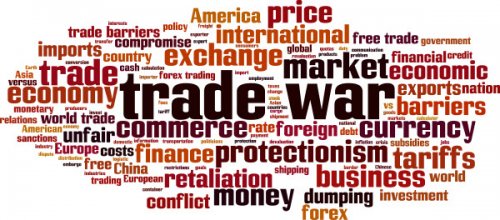With President Trump’s announcement of trade tariffs, fears of a trade war have overtaken the news cycle and added to market volatility in recent weeks.
But, is this fear really justified? This time on the Financial Sense Newshour, Jim Puplava takes a look at the reality behind the recent panic to determine what threat, if any, trade tariffs pose to the US economy.

Media Hype Doesn’t Equal Real-World Consequences
Quite often the media chooses to focus on a story or narrative without regards to the real-world impacts.
Recent discussions over tariffs leading us into a recession or 1930’s Smoot-Hawley-style depression are a perfect example.
“This really needs to be put into perspective,” Puplava said. “Global GDP right now is north of $75 trillion, and $50 to $60 billion of trade tariffs on steel and aluminum is not going to sink the US economy or the global economy for that matter.”
Leveling the Playing Field
“Basically, what Trump is saying is, if the Chinese put a 25 percent tariff on something, we’re going to put a 25 percent tariff on something,” Puplava said. “If they have a 25 percent tariff and reduce it down to zero or 5 percent, we will reduce ours as well.”
The goal is to make it more advantageous for US companies to set up shop here to manufacture, bring jobs back here to the US, and reduce the trade deficit, Puplava stated.
No country can run perpetual trade deficits eventually without finding itself in trouble with its own currency, Puplava stated. This is important because the US dollar is the world’s reserve currency.
“The administration is basically getting tough, starting out with this $30 billion in steel and aluminum tariffs,” Puplava said. “It’s going to be a negotiating tactic, and I think eventually this is going to lead to some kind of settlement with China that is going to make it more favorable to the US”
Market Fears Are Overblown











Leave A Comment